-
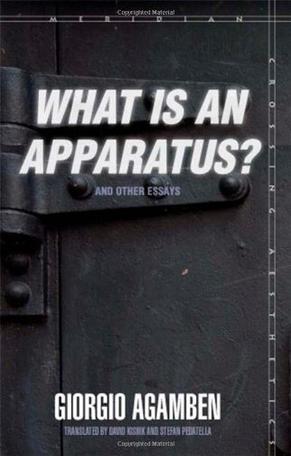
"What Is an Apparatus?" and Other Essays
The three essays collected in this book offer a succinct introduction to Agamben's recent work through an investigation of Foucault's notion of the apparatus, a meditation on the intimate link of philosophy to friendship, and a reflection on contemporariness, or the singular relation one may have to one's own time. "Apparatus" (dispositif in French) is at once a most ubiquitous and nebulous concept in Foucault's later thought. In a text bearing the same name ("What is a dispositif?") Deleuze managed to contribute its mystification, but Agamben's leading essay illuminates the notion: "I will call an apparatus," he writes, "literally anything that has in some way the capacity to capture, orient, determine, intercept, model, control, or secure the gestures, behaviors, opinions, or discourses of living beings." Seen from this perspective, Agamben's work, like Foucault's, may be described as the identification and investigation of apparatuses, together with incessant attempts to find new ways to dismantle them. Though philosophy contains the notion of philos, or friend, in its very name, philosophers tend to be very skeptical about friendship. In his second essay, Agamben tries to dispel this skepticism by showing that at the heart of friendship and philosophy, but also at the core of politics, lies the same experience: the shared sensation of being. Guided by the question, "What does it mean to be contemporary?" Agamben begins the third essay with a reading of Nietzsche's philosophy and Mandelstam's poetry, proceeding from these to an exploration of such diverse fields as fashion, neurophysiology, messianism and astrophysics. -
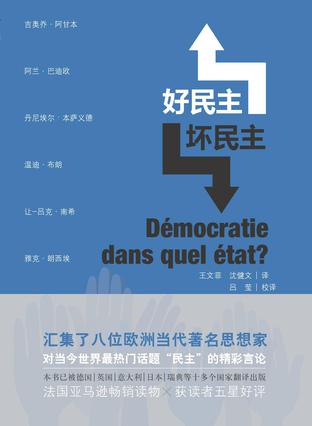
好民主,坏民主
英国的“怀疑论者”和“保守主义者”欧克肖特曾说“哲学不属于任何一个学科,哲学的任务是对学科的基本问题发出质疑。”本书正是遵循了这样一种思考原则,对现代政治的根基——“民主”,以及现代人的民主经验不断发问。 虽然都持有“怀疑论”的立场,但是本书的八位作者(其中两位是美国人:阿甘本、巴迪厄、朗西埃、南希、齐泽克、本赛德、布朗、罗斯)却一点也不保守,他们普遍出生在20世纪40-50年代,是68学运时期成长起来的知识分子甚至是当时的中坚力量,随着左翼思想在欧洲的崛起,以及现代福利国家和社会民主主义的建立,如今的他们代表着欧洲大陆思想界的至高点。 本书汇集了这八位思想家的政治思想随笔和发表在大众媒体上的公共言论,每位作者各一篇,每篇篇幅在一万字左右,通俗而不失深刻,短小而不失高远。 这8篇文章重点以2008年全球金融风暴之后西方社会的变化为背景,揭示出资本主义生产方式下民主制度的悖论和尴尬处境,并为未来社会的合理发展提出了新的可能性。 -
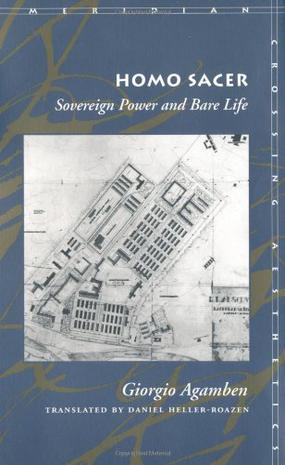
Homo Sacer
The work of Giorgio Agamben, one of Italy's most important and original philosophers, has been based on an uncommon erudition in classical traditions of philosophy and rhetoric, the grammarians of late antiquity, Christian theology, and modern philosophy. Recently, Agamben has begun to direct his thinking to the constitution of the social and to some concrete, ethico-political conclusions concerning the state of society today, and the place of the individual within it. In "Homo Sacer, " Agamben aims to connect the problem of pure possibility, potentiality, and power with the problem of political and social ethics in a context where the latter has lost its previous religious, metaphysical, and cultural grounding. Taking his cue from Foucault's fragmentary analysis of biopolitics, Agamben probes with great breadth, intensity, and acuteness the covert or implicit presence of an idea of biopolitics in the history of traditional political theory. He argues that from the earliest treatises of political theory, notably in Aristotle's notion of man as a political animal, and throughout the history of Western thinking about sovereignty (whether of the king or the state), a notion of sovereignty as power over "life" is implicit. The reason it remains merely implicit has to do, according to Agamben, with the way the sacred, or the idea of sacrality, becomes indissociable from the idea of sovereignty. Drawing upon Carl Schmitt's idea of the sovereign's status as the exception to the rules he safeguards, and on anthropological research that reveals the close interlinking of the sacred and the taboo, Agamben defines the sacred person as one who can be killed and yet not sacrificed--a paradox he sees as operative in the status of the modern individual living in a system that exerts control over the collective "naked life" of all individuals. -
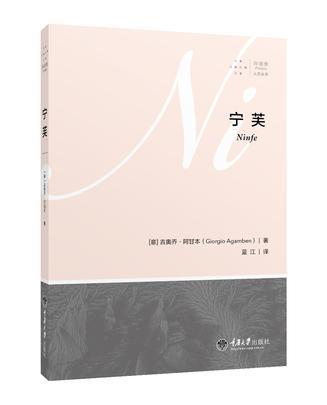
宁芙
•自古希腊以降,人们一直在找寻一种通向过去、激活记忆的方式。这正是阿甘本在《宁芙》一书中所讨论的主题:对时间与影像之关系的探索。 •过去与当下,记忆与影像,影像与宁芙。我们需要一种怎样的记忆技术,去穿透过去与当下之间的隔膜,去把握那个业已逝去的过去。在阿甘本看来,真正的记忆技术就是宁芙化的技术,只有与作为影像的宁芙结合,一种通向过去的可能性才能真正降临。 •阿甘本是少有的其思想和写作在多个领域都具有广泛影响力的作家。《宁芙》探讨了一系列关于美学理论的广泛研究课题,包括意大利舞蹈大师多梅尼科•达•皮亚琴察的“魅像”概念,德国艺术史学家阿比•瓦堡著名的《谟涅摩绪涅图谱》,瓦尔特•本雅明的“辩证影像”概念,以及芝加哥著名摄影师内森•勒纳在1972年的离奇发现。对于艺术理论和艺术史领域的读者,这是一本不可多得的研究文献。 内容简介 在探索打开过去之门的方式上,古希腊人用一种神秘的仪式,召唤出可以为我们带来过去叙事和幻像的谟涅摩绪涅女神。然而,现代思想家们却将我们通往过去的命运交付给一个影像。德里达的得意门生伯纳德•斯蒂格勒将我们面对影像的技术,理解为影像的自动化过程。 不过,从一开始,阿甘本就将他的影像哲学附着在德勒兹的重复的基面上,他所关心的并不是纯粹回到过去的可能,他认为我们必须在影像的碎片中,恢复一个潜在的过去,而不是仅仅恪守一个空洞的客观性原则。 在此意义上,阿甘本将影像比作宁芙。宁芙是古希腊神话和北欧神话中的仙子,她们并不是诸神,并不能享受永生,因此在阿甘本看来,她们是介于人与动物之间的门槛上的存在。宁芙就是影像的隐喻,影像是一种介于真正鲜活的生命与死气沉沉的物之间的门槛上的存在物。阿甘本通过追溯图像学研究的谱系,提出我们对过去的记忆封存在影像之中,我们唯有在与影像(宁芙)的结合中,才能去开启通向记忆、通向过去的可能性。 -
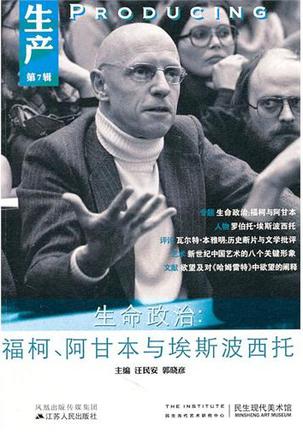
生产(第7辑)
《生产(第7辑):生命政治:福柯、阿甘本与埃斯波西托》讲述了对于“生产”的关注,源自马克思主义传统,正是在生产环节,马克思发现了资本增殖的秘密。马克思之后,“生产”获得更丰富的内涵:文化领域是知识生产,精神领域是欲望生产,政治领域是权力生产,社会变成一个巨大的生产机器——而所谓“消费社会”不过是它的一个反讽性注释。“生产”,成为诊断当代社会的关键词。另一方面,“生产”这个词对于今日中国人而言似乎别具意味:我们曾经身陷“生产”之笼,如今,我们期待这个迷失在历史深处的词语重新获得活力。当然,词语自有其命运,我们所能做的也只是邀请。最后,需要指出的是,“生产”的内在语义,就是生成,流变,活力,它符合当代知识分子的气质:永不停息地思考和批判。正是在这个意义上,“生产”是批判和思想的基本特征。 -
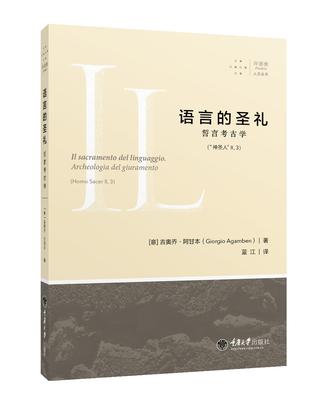
语言的圣礼:誓言考古学
编辑推荐 • 本书是阿甘本极具影响力的“神圣人”系列(Homo sacer II,3)中的作品。 • 阿甘本在追溯了主权、神圣性等思想的根源之后,转向了一个新领域:对“誓言”的哲学考古学研究。 • 在本书中,我们将看到阿甘本对“誓言如何产生了我们的语言,乃至包括法律和宗教在内的我们的整个生活的基本框架”这一问题的精彩论证。 • 阿甘本致力于跟随本雅明的脚步,重拾被传统语言哲学所忽视的一个经典维度,即生命形式维度,并在此基础上重构出语言哲学的真正根基。 内容简介 在本书中,阿甘本从意大利学者保罗•普罗迪的《权力的圣礼》引入,探讨了作为西方政治的基础的誓言现象的根源,并进一步探索了语言对我们生命形式以及生活意义的构建问题。 阿甘本认为,对语言的研究,需要一种考古学的努力,即我们需要发掘出,语言诞生的最原初的事件。而在阿甘本看来,这个最原初的语言事件,就是誓言。由于我们的一切语言关系,都是在誓言所构建的词与物的关系中塑造出来的,于是誓言便成为了突破维特根斯坦的语言游戏规则的玻璃瓶的最主要的突破点。 一开始,阿甘本就拒绝了在巫术—宗教中寻找誓言的起源这一普遍观念,他认为誓言指向了一种对语言经验的特殊回应,这一回应催生了我们现在所知的宗教和法律。正是誓言让我们的政治体制和宗教体制成为可能。这样,誓言这种特殊的语言现象,便涉及一种元语言。那么,我们人作为一种有生命的存在,依附在这种元语言之上,在元语言事件发生之后,我们才变得可以言说,我们才具有了某种体制和政治制度。 进一步的,阿甘本指出,真正的元语言哲学的任务,不是让语言脱离于生命形式本身,去探索语言的自在性体系,或者孤立地去谈语言内在的逻辑一贯性。阿甘本的语言哲学的价值在于,努力地将语言的装置(无论是语义符号学还是语用学)推向极致,在其最为脆弱的誓言一环,寻找突破口。